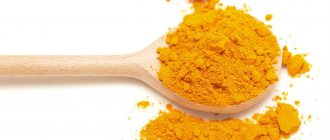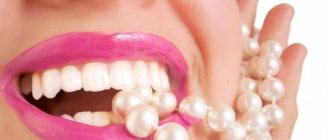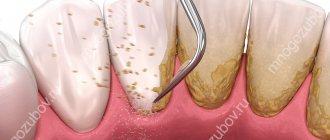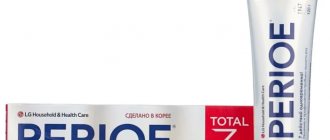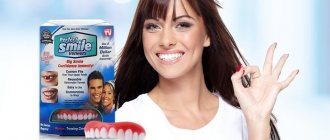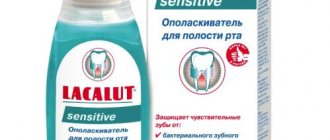15.09.2016
Author: Dentist-therapist Kuzub Yana Nikolaevna
To keep teeth healthy, both the general condition of the body, good hygiene, timely treatment, and the foods that the patient eats daily are important. Dentist-therapist at the Attribute Clinic, Yana Nikolaevna Kuzub, shares useful information about what foods and drinks are healthy, and what you should avoid to maintain a healthy smile.
Sweets
The main “enemies” of teeth are chewing candies and caramel. Pieces of toffee or other chewing candies can get stuck in the spaces between teeth, contacting the enamel for a long time, causing accelerated growth of bacteria. Caramel changes the composition of saliva if it is absorbed; it can cause tooth decay, chips, cracks if it is chewed.
Dried fruits are considered harmful sweets. They contain a lot of sugar, stick to teeth, and get stuck in the spaces between teeth.
The exception is dark chocolate, which is considered beneficial for teeth due to the content of polyphenols and flavonoids. They have antibacterial properties and slow down plaque formation.
Carbonated drinks
When we talk about enamel, we must remember such a concept as “pilicule”. This is a bacterial protective film that saliva forms on the surface of the tooth. Over time, it becomes dirty, we clean it with a toothbrush, and then it forms again. Firstly, carbonated drinks contain harmful sugar. It feeds microflora that destroys enamel. Secondly, they contain acids that also destroy the pilicule. For the sake of experiment, just take just one sip, and you will feel that your tongue is not sliding so smoothly over the surface of the tooth.
Article on the topic From candies to oranges. 11 foods that harm your teeth
Caffeine
Drinks containing caffeine (any type of coffee, cola, energy drinks) provoke dehydration and slow down the absorption of vitamins and minerals (including calcium). They stain teeth, change the color of enamel, making it darker. Therefore, dentists at the Dentospas clinic do not recommend drinking coffee in large quantities.
Caffeine also has beneficial properties: it contains fluoride and has an antibacterial effect, but coffee drinks do more harm to teeth than good. You can replace coffee with chicory. For those who are used to drinking a lot of green tea, it is better to switch to herbal teas.
You have questions?
We will call you back within 30 seconds
+7
Sour fruits and juices
It has been scientifically proven that acidic fruits, such as pineapples, oranges (and juices from them), destroy hard tooth tissue, although for this you need to eat kilograms of them. In any case, after eating fresh and sour fruits, you should rinse your mouth to get rid of increased acidity. It is believed that drinking juices through a straw will protect your teeth, but in fact, during swallowing, when the tongue is pressed to the upper palate and the cheeks are pulled back, rinsing still occurs in the oral cavity. Don't forget this.
Article on the topic
Drink milk and chew apples. How to eat for healthy teeth
Medicines and alcohol
Some medications and all alcoholic drinks disrupt the water balance and cause dry mouth. The secretion of saliva decreases, it stops constantly washing the teeth, cleaning them and saturating the enamel with minerals. Dry mouth makes the gums vulnerable to injury and inflammation, which can lead to periodontal disease. Sweet alcoholic drinks are especially harmful: liqueurs, wines. Adding to the dryness when consuming them is the effect of sugar and acids. Red wine additionally stains the enamel.
WATER
Since the human body consists of more than half of water, it is logical to conclude that water is an important product for our body. Water is also good for dental health.
If you drink little water during the day (precisely water. Juices, soda, tea, coffee, soups do not count), among other negative consequences, you will experience a feeling of dry mouth. This means that not enough saliva is produced: a logical consequence of dehydration, because saliva is 98.5% water.
The composition of saliva includes mucins (no more than 0.5% of the total chemical composition of saliva). Due to them, saliva not only has viscosity and elasticity, but also prevents the formation of bacterial plaque, because blocks the proliferation of harmful microorganisms.
However, you need to know that saliva can harm your teeth if you like sweets. In this case, it will contain large amounts of glucose, as a result of which it will only harm tooth enamel.
In addition to the fact that the possibility of salivation that protects teeth depends on water, water helps to mechanically clean the oral cavity of food debris, plaque and acids harmful to tooth enamel.
Roasted seeds and nuts
Fresh nuts and seeds can even be healthy, but when heated, most of the valuable substances are destroyed. Instead of vitamins, fatty acids, amino acids, harmful substances are formed. Particles of seeds and nuts can get stuck in the spaces between teeth, under the edge of the gums. If a person often gnaws on seeds, he injures and wears out the enamel on his teeth. Crunching hard nuts cannot be called useful either. If you cannot do without such snacks, it is better to cook them yourself, frying them so that they remain raw inside.
The beauty of a smile and your favorite food: where is the connection?
The food we eat has a huge impact on our teeth.
On the one hand, it is a source of vitamins and minerals that are necessary for healthy growth and development of teeth, enamel strength and good gum health.
But on the other hand, some products can damage teeth, stain enamel and promote the development of harmful microflora. “Fortunately, these foods, such as candy, are usually harmless in moderation,” says dentist Matthew Messina, a spokesman for the American Dental Association. “Problems arise when we get too carried away with one product.”
Any hot and cold foods
They are dangerous due to sudden changes in temperature, which can cause the enamel to crack. Harmful microorganisms accumulate in microcracks. Cracks expand over time, leading to chipping or tooth decay. Hot drinks and foods are additionally dangerous for the mucous membranes. Her regular burns can provoke the appearance of stomatitis. The combination of hot and cold is considered the most dangerous (for example, if a hot meal is washed down with a chilled drink).
Enamel-damaging products
To prevent dental diseases, it is necessary to carry out competent preventive measures. Without a properly selected and balanced diet, it is impossible to save teeth.
The list of harmful products is presented:
- Sweet sparkling water
Drinks are dominated by sugar and large volumes of carbon dioxide, which negatively affect the condition of hard tissues. The first sign of damage is the problem of increased sensitivity of teeth to temperature, acidity and other mechanical factors. Soda causes damage to the entire body - it provokes flatulence, disrupts the functioning of the digestive system, and increases blood glucose levels.
- Sweets and chocolate
Sugar causes yellowing of the enamel and its active destruction. Particularly harmful products include:
- caramel;
- toffee;
- sucking and jelly candies.
Prolonged resorption or chewing leads to local mechanical injuries. Due to glucose, the rate of calcium absorption decreases, and calcium deficiency begins. Acceptable substitutes include dark chocolate in small quantities. It contains substances with an antibacterial effect that slow down plaque formation.
- Dried fruits
Dried fruits contain huge amounts of sugars due to loss of moisture. The product contains its maximum concentration - up to 60%. The viscous consistency of the product leads to the adhesion of small particles in hard-to-reach places. As a result, prolonged contact of a piece of dried fruit with teeth causes the development of caries.
- Coffee drinks
The appearance of pigmented spots and partial darkening of the enamel is associated with coffee. To reduce the risk of staining, you should thoroughly rinse your mouth or use a straw after each cup of drink. The tube will help reduce the size of the contact surface.
- Simple carbohydrates
Sucrose, fructose, glucose and glycogen are found in large quantities in jams, pastries, white rice, custard cakes, etc. Excessive consumption of such products quickly increases body weight and negatively affects the condition of teeth. During contact with saliva, the substances contained in sweets begin to release organic acids. An increased concentration of lactic acid and sugars activates demineralization processes.
- Roasted seeds and nuts
The high content of minerals and nutrients that help strengthen gums and enamel does not protect against mechanical injuries when consuming products. The hard surface provokes the appearance of microscopic cracks and chips, and attempts to remove the shell with the front incisors quickly thin the enamel and cause caries.
Citrus
Any citrus fruit contains citric acid, which causes calcium to be washed out of the teeth. Because of it, the enamel can become more sensitive. With frequent consumption of sour citrus fruits, areas of irritation and inflammation may appear on the mucous membranes and gums.
To protect your teeth from harmful products, DentoSpas recommends:
- brush your teeth twice a day (in the morning and at night - before bed, after dinner);
- floss after every meal or snack;
- After drinking any harmful drinks, use a mouthwash that does not contain alcohol;
- eat more solid foods, greens, hard vegetables, fruits: chewing them helps clean the surface of the enamel and interdental spaces;
- It is better to drink sweet carbonated and alcoholic drinks through a straw, which will reduce the harmful effects on the enamel.
Foods for healthy teeth: vitamins are very important
Vitamins are essential micronutrients that perform a catalytic function aimed at ensuring humoral regulation and metabolism in the body. A lack of vitamins can provoke a whole range of dental problems that can lead to disease or complete loss of teeth.
The body can obtain most vitamins after consuming the following foods:
- Vegetable oils, nuts (walnuts, hazelnuts, almonds), beef liver, butter - contain a lot of vitamin E, which has an active antioxidant effect and is involved in the biosynthesis of proteins;
- Citrus fruits, greens, rose hips, black currants, peppers contain large amounts of vitamin C. It promotes collagen synthesis. Products for gums are recommended to be consumed raw, without subjecting them to prolonged heat treatment;
- Sea fish meat, beef liver, dairy products, brewer's yeast - contain vitamin D, which is responsible for metabolism and improves the absorption of calcium into dental tissue.
If you want to create the right diet to strengthen and improve the aesthetics of your teeth, consult a nutritionist or dentist. They will take into account the individual characteristics of your body and give valuable recommendations!
Top 8 healthy foods for gums
Bleeding, weak and pathologically altered gums will not be able to support healthy teeth. That is why, first of all, you should select useful substances for healthy gums, and then strengthen your teeth.
In numerous illustrations showing healthy foods for teeth in pictures , you can see what foods should be included in the diet to maintain healthy gums:
- Pumpkin, carrots, and apples, due to their structure and chemical composition, ideally keep gums in order.
- Dairy products strengthen the circulatory system.
- Leafy vegetables contain a large amount of vitamins.
- Sea fish is full of multivitamins and healthy fats.
- Garden and forest berries are a real chest of vitamins.
Eating these foods daily will lead to healthy teeth. They are oversaturated with vitamin complexes and other useful components, adjust metabolic processes in tissues and clean teeth from plaque. As a result, the gums become strong and the teeth become healthy.
What measures should be taken to maintain dental health during and after meals?
It is necessary, if possible, to avoid snacking between meals, since tooth enamel can be restored during those few hours when a person does not eat anything. In addition, you should not eat too cold or too hot food, especially dishes that contrast with each other in temperature, to prevent the formation of microcracks in the enamel. What you eat must be chewed thoroughly and intensively. Avoid foods that are too hard and require effort to chew. Juices should be drunk through a straw. Acid-containing fruits and citrus fruits are best chewed and swallowed quickly.
After meals, you can use chewing gum in which the sugar is replaced with dental-safe sweeteners (for example, xylitol). When consuming seeds, baked goods and confectionery products containing them, as well as corn in any form, you cannot do without a toothpick. After each consumption of sugar-containing and acidic foods, it is necessary to thoroughly rinse the mouth with water or a special elixir or brush your teeth.
Jam and berries with small seeds
Seeds from raspberries, strawberries, blackberries and other berries can get stuck between teeth and in fissures (small grooves and depressions on the chewing surface of the teeth). If they are not removed quickly and correctly, this will inevitably lead to unpleasant consequences.
Treat without a drill. What procedures have dentists refused? More details
Clinical researches
ASEPTA toothpastes are clinically proven effective. For example, it was confirmed that regular use of professional toothpaste ASEPTA COFFEE AND TOBACCO for a month improved the hydration of the mucous membrane by 3.3 times, the remineralizing efficiency increased by 3.9 times, at the same time, the cleansing effect had increasing dynamics and reached 60 .5% at 4 weeks of use.
Sources:
- Clinical and laboratory assessment of the influence of domestic therapeutic and prophylactic toothpaste based on plant extracts on the condition of the oral cavity in patients with simple marginal gingivitis. Doctor of Medical Sciences, Professor Elovikova T.M.1, Candidate of Chemical Sciences, Associate Professor Ermishina E.Yu. 2, Doctor of Technical Sciences Associate Professor Belokonova N.A. 2 Department of Therapeutic Dentistry USMU1, Department of General Chemistry USMU2
- Report on determining/confirming the preventive properties of toothpaste “ASEPTA PLUS” COFFEE and TOBACCO Author: doctor-researcher A.A. Leontyev, head Department of Preventive Dentistry, Doctor of Medical Sciences, Professor S.B. Ulitovsky. First St. Petersburg State Medical University named after. acad. I.P. Pavlova, Department of Preventive Dentistry
- Report on determining/confirming the preventive properties of toothpaste “ASEPTA PLUS” GENTLE WHITENING” Author: doctor-researcher A.A. Leontyev, head Department of Preventive Dentistry, Doctor of Medical Sciences, Professor S.B. Ulitovsky First St. Petersburg State Medical University named after. acad. I.P. Pavlova, Department of Preventive Dentistry
